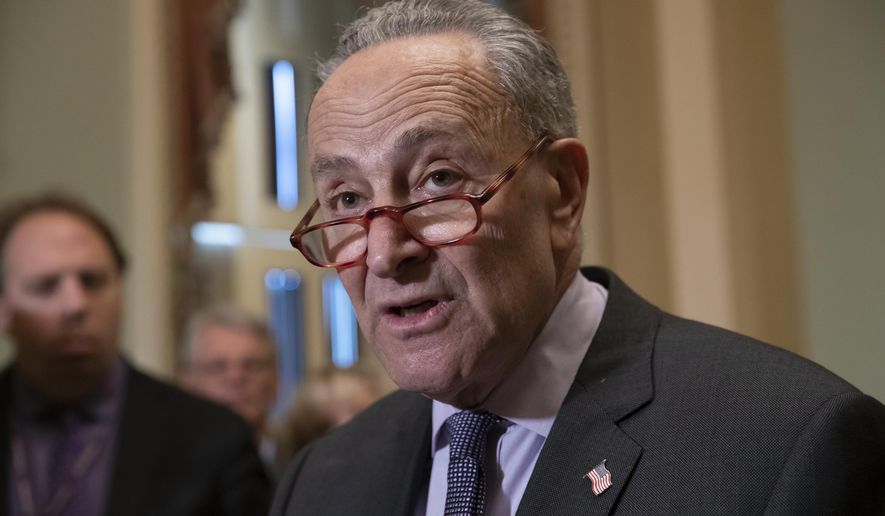Senate Minority Leader Charles E. Schumer on Friday demanded that a deal for an infrastructure program include measures to combat climate change, throwing down the gauntlet on road and bridge projects that was one of the only areas of potential agreement between Capitol Hill Democrats and President Trump.
By tying infrastructure to climate change, which Mr. Trump has called a hoax, Mr. Schumer erased any doubts that the new Congress will grind to a halt on the president’s agenda.
“Any infrastructure package considered in 2019 must include policies and funding to transition to a clean energy economy and mitigate the risks that the United States is already facing due to climate change,” Mr. Schumer, New York Democrat, wrote in a letter to the president. “Climate change is real, caused by humans, and its impacts are already being felt in communities across the country.”
He included a long list of demands such as permanent tax credits for clean energy and electric cars — the type of Obama-era program Mr. Trump has been rolling back.
Mr. Trump has weathered fierce criticism for bucking climate change measures, from easing restrictions on coal-fired power plants to pulling the U.S. out of the Paris climate accord.
The White House did not immediately respond to Mr. Schumer’s letter.
But Larry Kudlow, director of the president’s National Economic Council, said fossil fuels would be part of an infrastructure plan, including oil pipelines and shipping terminals for liquefied natural gas.
A massive program to rebuild America’s crumbling highways, bridges and airports tops Mr. Trump’s agenda and Democrats’ wish list. It was the one area of common ground where optimists thought there could be progress when Democrats take control of the House next year and Mr. Trump for the first time confronts a divided government.
At first, the biggest hangup to a deal was how to pay for it. Mr. Trump wanted to use public-private partnerships, or P3s, to reduce the budget impact. Democrats wanted at least $1 trillion in new federal spending.
The battle now shifts to how much of the infrastructure package is climate change policy, as Mr. Schumer aligns himself with the liberal base that energized the Democratic Party in the midterm elections.
Billionaire Democrat activist Tom Steyer cheered Mr. Schumer’s stance.
“These are not requests. They are demands,” tweeted Mr. Steyer, who is eyeing a 2020 presidential run. “If they are not met, no Democrat should support massive investment in fossil fuel infrastructure that will inevitably have to be scrapped immediately. @SenSchumer must refuse to fund destructive stupidity.”
In the letter, Mr. Schumer cited the recent congressionally mandated report by the administration that blamed man-made climate change for recent hurricanes and wildfires and warned of increasing devastation in coming decades if not addressed.
Mr. Trump balked at the multi-agency report, which critics called alarmist and noted it was authored by longtime climate change advocates.
“I don’t believe it,” the president said of the report. “Right now we’re at the cleanest we’ve ever been. It’s very important to me. [But] if we’re clean and everyone else is dirty, that’s not so good.”
Global greenhouse gas emissions are expected to rise this year for the second consecutive year, after posting no growth from 2014 to 2016, according to a new study released this week. U.S. emissions are expected to rise 2.5 percent, according to the study from the Global Carbon Project. Emissions from China, the world’s biggest emitter, are expected to increase 5 percent, and India more than 6 percent.
Mr. Schumer’s list of demands include:
• Provide permanent tax incentives for domestic production of clean electricity and storage, energy-efficient homes and commercial buildings, electric vehicles, and modernizing the electric grid;
• Invest in both storage and transmission capacity to move renewable power around the country;
• Invest in smart grid and micro-grid technology, and prepare the grid for more locally generated renewable energy;
• Invest in and save taxpayer dollars through energy-efficiency upgrades for public buildings, schools, affordable housing, and other infrastructure;
• Substantially increase investments in research, development, and deployment of next-generation clean energy, energy efficiency, carbon reduction, and energy storage technologies;
• Invest in resilient transportation, water, waste, and sewer infrastructure;
• Provide funding to help communities reduce the vulnerability of their critical infrastructure to extreme weather and natural disasters;
• Establish new resilient communities revolving loan fund for communities to invest in resilient infrastructure, including natural infrastructure solutions such as restored wetlands, floodplains, and other natural features that can mitigate property damage and loss of life;
• Invest in the natural environment, specifically in conservation, wildlife habitat, and deferred maintenance on our public lands, to power the robust outdoor economy and secure our shared natural heritage for future generations;
• Significantly reduce the release of methane pollution as a by-product of domestic energy production.
“A single infrastructure bill will not solve our climate problem in its entirety, but it is an important first step,” Mr. Schumer wrote.
• Dave Boyer contributed to this report.
• S.A. Miller can be reached at smiller@washingtontimes.com.




Please read our comment policy before commenting.